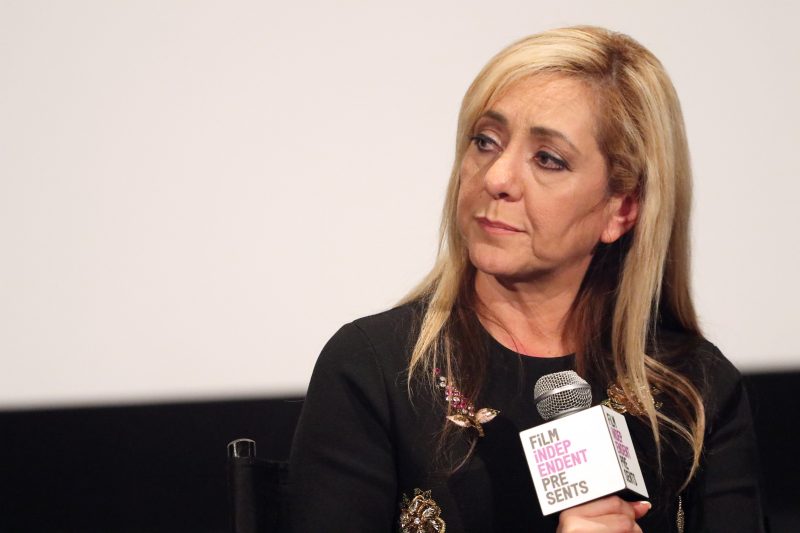‘Lorena’ documentary tells Lorena Bobbitt’s story in a new light
Lorena Gallo, better known by her married name Lorena Bobbitt, at a screening of the documentary “Lorena”, which tells the story of her life (Tommaso Boddi)
Los Angeles (AFP) – Mention the name Lorena Bobbitt and the reactions are all too predictable: the knowing snigger, the grimace that indicates pain combined with a protective gesture over the crotch area.
Less frequently do people talk of the sensational case in terms of the domestic violence that led Lorena Bobbitt to cut off her husband’s penis in 1993.
Twenty-five years on, Lorena Bobbitt goes by her maiden name Gallo and tells her side of the story in “Lorena,” a four-part documentary on Amazon.
“I knew the scars would be opened up again, that I would feel anguish reliving these painful memories that I had practically buried,” the 48-year-old, who was born in Ecuador, told AFP.
“But I did it because I think that as a woman, as a mother, as a survivor, it is my duty to use my voice, which many victims of domestic violence don’t have,” she said.
The story of Lorena and John Wayne Bobbitt garnered massive global attention. On June 23, 1993, Lorena, then 24, cut off her husband’s penis as he slept after he had raped her, she said.
The press had a field day, giving the drama huge coverage. But the story also opened up a debate that had been largely ignored until then.
“My case helped lift the taboo on marital violence, sexual abuse and rape by a partner,” said Lorena, who was acquitted at her trial by reason of temporary insanity.
She was instead sent to a mental hospital where she was discharged after a month.
– Distrust –
The documentary, directed by Joshua Rofe and produced by Oscar-winning film-maker Jordan Peele, opened at the Sundance film festival in January.
When Rofe approached her with the project, Lorena had finally found the peaceful and almost anonymous life she had dreamt of when she was in the spotlight of a global media obsession.
“I didn’t want to do it,” recalled Lorena, who now sports straight blonde hair, unlike the dark curls she had back at the height of her fame.
“I was dubious because until now, [other productions] had always focused on John, on the act itself, in a very sensationalist manner which overlooked what I had been through, and that really displeased me,” she said.
Rofe’s film traces in minute detail Lorena’s life, from her move as a young girl from the Venezuelan capital Caracas, where her family lived, to Virginia in the United States, where she still lives.
The film then moves on to her marriage, the start of the spousal abuse, the mutilation, the trial, and then on to her life these days.
Her ex-husband maintains to this day that he never abused her.
“He’s a pathological liar,” said Lorena, without ever losing her calm.
“How is it possible for him to keep on lying? He went to jail for domestic violence, not with me but with other women.”
Rofé also interviewed police officers who worked on the case, lawyers, the district attorney, journalists and activists.
He shows excerpts from the trial and retraces John Wayne Bobbitt’s life as he launched a short-lived career in porn movies once his penis had been re-attached.
He also looks at the media harassment of Lorena and how she worked to rebuild her life with a new partner and her daughter, now 13.
“You forgive but you don’t forget,” she said. “John is no longer on my mind, I don’t live my life thinking about him.”
– No regrets –
A practising Catholic, she founded an NGO for victims of domestic abuse, and told her daughter her story when she was still very young.
“She’s a very strong child, very mature,” she said.
She hesitated to show the girl the movie, which has some very explicit content. But her daughter ended up seeing it anyway.
“She said, ‘Mom, I didn’t know you were so strong,’ and gave me a hug,'” she said.
And because all that she went through made her the person she is today, Lorena says she has no regrets.
“How can you regret something you had no control over? I didn’t want to be in that situation. It’s not something I went looking for,” she said.
“My case helped a lot but there is still so much to do,” such as changing laws that still allow domestic abusers to purchase firearms, she said.
Disclaimer: This story is published from a syndicated feed. Siliconeer does not assume any liability for the above story. Validity of the above story is for 7 Days from original date of publishing. Content copyright AFP.


